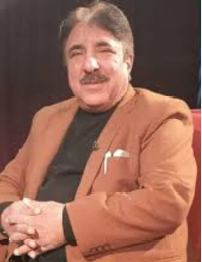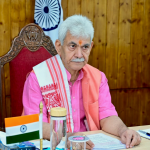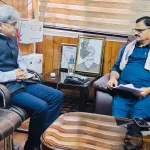In the quiet lanes of Drogjan, Srinagar, a young boy stood out not for mischief, but for an unusual obsession books. That boy, Bashir Arif, grew to become one of Kashmiri broadcasting and literary’s most celebrated voices—a poet, painter, writer, and former Deputy Director General of Radio Kashmir, now All India Radio.
In an exclusive interview with Rising Kashmir, the veteran artist shared intimate glimpses of his journey, marked by dedication and deep cultural devotion.
“While other children spent their pocket money on toys and sweets, I bought books,” Arif reminisced with a nostalgic smile. “I frequented Noor Muhammad Tajir-e-Kutub, a famous Srinagar bookshop, picking volumes on literature and Kashmiri Sufi poets like AhadZargar, WazaMehmood, and Rasool Mir.”
His unconventional passion often puzzled his parents, who wondered why he preferred books over toys. “Even then, I was drawn to poetry, literature, and art. I never wasted time on unproductive activities,” he said.
Arif’s literary spark ignited early—his first nazm was published in the school magazine of Sri Pratap School when he was in Class 8. He credits his Urdu teacher, Muhammad BahuddinWafai, as his first mentor. “He was a gem. His encouragement planted seeds of confidence in me.”
Later, the iconic playwright and actor Somnath Sadhu shaped his creative aspirations. “I was deeply influenced by his writing and wanted to be like him.”
The turning point came when Arif got an opportunity to speak on a children’s programme on Radio Kashmir. “My background and love for language helped me perform, and that moment changed everything.”
His association with the station grew, and he became a regular on the popular programme Sonzal, earning Rs 5 for his first role. In 1966, his performance in Zoon Dabskyrocketed his popularity across Kashmir. Among his iconic contributions is the timeless Kashmiri song “HesNuenam Ha Balyare, JananeZeariBozeya”, composed during his posting in Leh after inspiration from a haunting local tune.
Reflecting on radio’s place in the digital age, Arif remains hopeful: “Radio will always stay relevant. It’s like the film Sholay—you may never get those exact characters again, but cinema continues. The essence remains, even if the form evolves.”
Now in his later years, Bashir Arif is far from idle. He is currently compiling a collection of his poetry and literary works. Despite his accomplishments, he carries one quiet regret: “Some of my books were lost over the years. That’s a pain I still carry.”
He also had a word of advice for Kashmir’s youth: “Stay away from drugs. Time is precious—don’t waste it. Seniors must guide the younger generation, and youngsters must value the arts and heritage we are blessed with.”
Bashir Arif’s life is a radiant tapestry of creativity, resilience, and devotion to Kashmir’s cultural soul. His voice, etched into the history of Radio Kashmir, continues to echo—gentle yet profound, like the poetry he so dearly loves.








